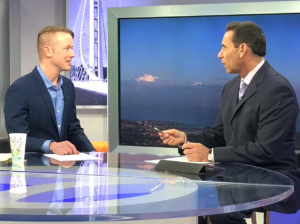
Before coming to PR, I spent many years in TV news. Countless hours of writing, producing and camera work has left me with the view that in order to make great television, you must have great guests. Energetic and articulate, a good guest must be well-versed in their topic and, very importantly, trained.
The importance of media training has never been clearer than when I recently made some media appearances of my own. It was great fun to be back around TV news for interviews about a recent Bospar survey on calling my home city “Frisco” or “San Fran”— when in fact it should be called “The City” or San Francisco. And nothing else!
The upshot is that my media appearances were a bit uneven because I didn’t prepare very well. With my work history, I was confident in my ability to do well on camera, particularly because I media train clients here at Bospar. For my first appearances, my preparation was nearly flawless. Employing a professional media coach to refresh my skills certainly helped, and I curated some effective sound bites. Studious practice meant that these first interviews were a big success, easily delivering my sound bites and key points.
However, having breezed through the first interviews, I became guilty of getting overconfident for the next round. Thinking that I needed no more rehearsals or training, I got mixed up during a critical moment and said, “We are one happy world!” when I was intending to say, “We are the world!” – a mildly embarrassing and silly moment.
That’s why I prepared rigorously for my final TV appearances. Going back to my professional roots, I implemented a mock interview format and worked with a former journalist and family to practice repeatedly. More importantly, I wrote everything down, enabling me to process and internalize the content I wished to convey.
This technique really helps one absorb the material, making it easier to remember key facts when the cameras (and the pressure) are on. And while our survey was a light news item, those trying to convey critical facts and figures should drill extensively on that data, even to the point of using flashcards or printed talking points. In addition, practicing challenging interview questions can help prevent the possibility of things going off-track.
Being prepared and conscious of my previously flubbed line, I approached the final interview conservatively. Confident in my preparation, my rehearsals enabled me to land a great anecdote about Kamala Harris and to complete the interview successfully. The lesson learned, of course, is to not get too cocky and to have a plan.
This was a useful reminder to me – even as a seasoned pro – that practice and preparation make perfect. They will empower you to project a more professional image on TV and get better results – which I now know from firsthand experience!

